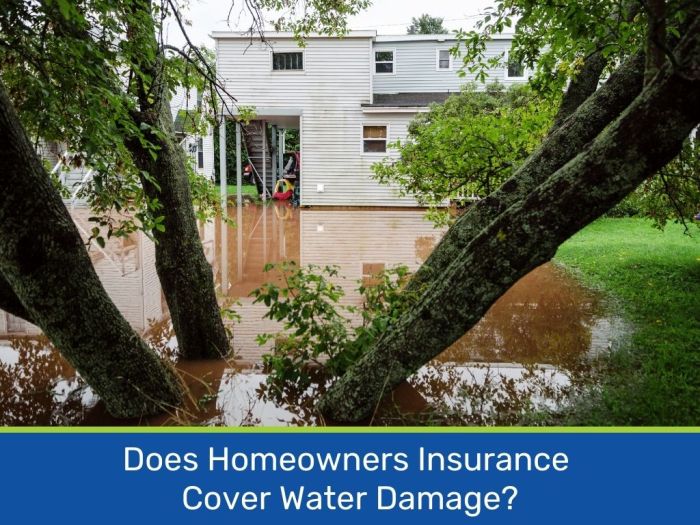Does home insurance cover water damage? This question often leaves homeowners puzzled and concerned. Let’s delve into the intricacies of water damage coverage to shed light on this crucial aspect of home insurance policies.
In this detailed exploration, we will uncover the types of water damage covered, exclusions and limitations to be aware of, steps to take in case of water damage, and much more.
Introduction to Home Insurance and Water Damage Coverage

Home insurance is a crucial financial protection that homeowners invest in to safeguard their property in case of unforeseen events. It typically covers damages caused by perils such as fire, theft, vandalism, and certain natural disasters. However, one common issue that homeowners may encounter is water damage, which can result from various sources within the home.
When it comes to understanding homeowners insurance, knowing the basics is essential. This guide on basic homeowners insurance coverage breaks down the key components such as dwelling coverage, personal property coverage, liability protection, and additional living expenses coverage.
Importance of Understanding Water Damage Coverage, Does home insurance cover water damage?
It is essential for homeowners to have a clear understanding of what their home insurance policy covers regarding water damage. Being aware of the extent of coverage can help prevent financial strain in the event of water-related incidents.
When it comes to homeowners insurance, understanding the basics is crucial. You can learn more about basic homeowners insurance coverage to ensure your property is adequately protected. Additionally, diving into details like what HO3 home insurance covers can help you make informed decisions. Another essential aspect is personal property insurance in homeowners policies , which safeguards your belongings in case of theft or damage.
- Understanding the specific inclusions and exclusions related to water damage can help homeowners make informed decisions about their insurance needs.
- Having adequate coverage for water damage can provide peace of mind and ensure that the necessary repairs or replacements are taken care of in a timely manner.
- Without proper coverage, homeowners may face significant out-of-pocket expenses to address water damage issues, which can be financially burdensome.
Common Water Damage Scenarios Covered by Home Insurance
Home insurance policies typically cover water damage resulting from sudden and accidental incidents, such as burst pipes, plumbing leaks, or appliance malfunctions. Some common scenarios where water damage coverage may apply include:
- Damage caused by a burst pipe or plumbing system failure.
- Leaking roof that leads to water intrusion and damage to the interior of the home.
- Appliance malfunctions, such as a dishwasher or washing machine overflow, causing water damage to floors and walls.
Types of Water Damage Covered by Home Insurance

When it comes to water damage, home insurance policies typically cover a variety of situations. Understanding the different types of water damage that are covered can help homeowners make informed decisions about their insurance coverage.
Water Damage from Burst Pipes
- Home insurance policies usually cover water damage caused by burst pipes.
- For example, if a pipe bursts in your home and causes water damage to your floors or walls, your insurance policy may help cover the cost of repairs.
Water Damage from Leaking Appliances
- Leaking appliances, such as dishwashers or washing machines, are also typically covered under home insurance policies.
- If a leaking appliance causes water damage to your home, your insurance policy may help cover the cost of fixing the damage.
Flooding from Natural Disasters
- While damage from burst pipes and leaking appliances is usually covered, flooding from natural disasters like hurricanes or heavy rains may require additional flood insurance.
- It’s important to understand the limitations of your home insurance policy when it comes to flooding and consider purchasing additional coverage if you live in a flood-prone area.
Comparison of Different Insurance Policies
- It’s essential to compare and contrast different insurance policies in terms of water damage coverage.
- Some policies may offer more comprehensive coverage for water damage, while others may have limitations or exclusions.
- Consider factors such as coverage limits, deductibles, and additional endorsements when selecting a home insurance policy to ensure you have adequate protection against water damage.
Exclusions and Limitations in Water Damage Coverage: Does Home Insurance Cover Water Damage?

When it comes to water damage coverage in home insurance policies, there are certain exclusions and limitations that policyholders should be aware of in order to fully understand their coverage.
Common Exclusions Related to Water Damage
- Damage from floods: Most standard home insurance policies do not cover damage caused by flooding. Policyholders may need to purchase separate flood insurance to protect their homes from this type of water damage.
- Gradual damage: Insurance typically does not cover water damage that occurs gradually over time, such as leaks that go unnoticed for an extended period.
- Maintenance-related damage: Any damage resulting from lack of maintenance or neglect, such as a leaky roof that was not repaired in a timely manner, is usually not covered.
Limitations of Coverage for Water Damage
- Policy limits: Home insurance policies often have limits on the amount of coverage provided for water damage. Policyholders should review their policy to understand these limits.
- Deductibles: Policyholders are typically required to pay a deductible before the insurance coverage kicks in for water damage claims. The amount of the deductible can impact how much the policyholder receives for a claim.
- Exclusions based on the cause of damage: Some policies may exclude certain types of water damage based on the cause, such as damage from a sewer backup or water that seeps in through the foundation.
How Policyholders Can Navigate Exclusions and Limitations Effectively
- Review your policy: It’s important for policyholders to carefully review their home insurance policy to understand what is and isn’t covered when it comes to water damage.
- Consider additional coverage: If certain types of water damage are not covered by your standard policy, consider purchasing additional coverage to fill those gaps.
- Maintain your home: Regular maintenance and upkeep of your home can help prevent water damage and ensure that any claims you make are not denied due to neglect.
Steps to Take in Case of Water Damage
Upon discovering water damage in your home, it is crucial to act quickly to minimize the extent of the damage and ensure a smoother claims process with your insurance company.
Immediate Steps to Take
- Contact your insurance company: Notify your insurance provider as soon as possible to start the claims process and get guidance on the next steps.
- Document the damage: Take photos or videos of the affected areas before beginning any cleanup or repairs. This documentation will be essential for your insurance claim.
- Stop the source of water: If possible, identify and stop the source of the water leak to prevent further damage.
- Remove excess water: Use towels, mops, or a wet/dry vacuum to remove standing water from the affected areas.
- Begin drying out the space: Open windows, use fans, and dehumidifiers to help dry out the affected areas and prevent mold growth.
Filing a Water Damage Claim
- Provide detailed information: When filing a claim, be prepared to provide detailed information about the cause of the water damage, the extent of the damage, and any steps you have taken to mitigate further damage.
- Work with your insurance adjuster: Your insurance company will likely send an adjuster to assess the damage. Cooperate with them and provide any requested documentation or information promptly.
- Get repair estimates: Obtain estimates from reputable contractors for the repair work needed and share this information with your insurance company.
- Keep records: Keep a record of all communication with your insurance company, including emails, phone calls, and any paperwork related to your claim.
Documenting and Proving Water Damage
- Keep receipts: Save receipts for any expenses related to water damage cleanup and repairs, as these may be reimbursable by your insurance company.
- Retain samples: If possible, keep samples of damaged materials or items as evidence for your claim.
- Follow up: Stay in touch with your insurance company throughout the claims process to ensure that your claim is being processed in a timely manner.
In conclusion, understanding the nuances of water damage coverage in your home insurance policy is essential for protecting your property and finances. By being informed and proactive, you can navigate potential water damage incidents with confidence and peace of mind.
For homeowners with an HO3 policy, it’s crucial to know what it covers. This comprehensive overview of what HO3 home insurance covers includes protection for the structure of your home, personal belongings, liability coverage, and additional living expenses in case of a covered loss.
Personal property insurance is a vital aspect of homeowners policies. This detailed explanation of personal property insurance in homeowners policies covers how it safeguards your belongings inside and outside your home, including coverage for items like furniture, electronics, and clothing.




